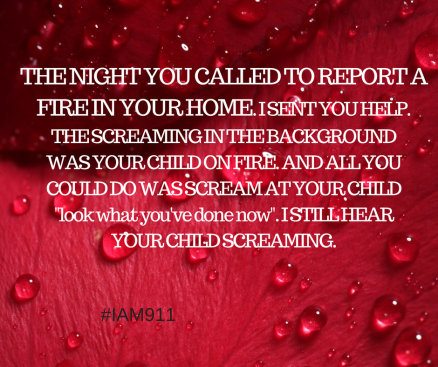By Stephanie Erb
The #IAM911 movement brought Post Traumatic Stress Disorder to light in telecommunications. Call takers never know what type of call they are about to answer – and when they hang up the phone, no matter what kind of call they just took, they have to quickly adjust their mindset and prepare for the next incoming call. This all happens in a matter of seconds.
Listening through violent acts
I received a 911 call and listened to a child scream in pain as he was burned by flames while his drunk father yelled at him.

After help arrived, I hung up and took the next call about someone who locked their keys in their car. The immediate shift in mindset is challenging, but a necessary part of the job.
All the different voices
Telecommunicators do not get to go to the scene and see these voices we hear. Some voices become so familiar that the caller's name, address and often date of birth, are singed into our memory. Some voices have obvious fear. Some have the sound of desperation and helplessness. Some have hatred.
The 911 calls we answer are sometimes quickly disconnected, and we never get to see what sounds like screams of sheer terror was actually a small child crying from a bump to the knee.
When officers are on a call and not answering their radio, we do not get to observe their status in the field – we just have to wait and wonder. It’s possible, and probable, that the officer doesn't hear us because he or she was playing catch with the neighborhood kids or talking with a member of the community.
Recognizing 911 call takers/dispatchers as first responders
Because telecommunicators are unseen by those we help, we are rarely thanked for the service we provide. Although we are the first line in public safety, we are usually the last one people think of when the term public service is discussed or used.
Many people assume that all 911 call takers/dispatchers want to be cops or firefighters. But that’s not the case for the telecommunications profession. Most 911 call takers/dispatchers are proud of their role in public safety and do not desire to switch public safety professions.
PTSD
PTSD and everyday job stress runs rampant through the telecommunications profession. It’s important for agencies and the communications centers’ teams to establish a routine check-in – especially after a rough call.
Make sure to offer to listen while they go get some fresh air or while they call their family. More importantly, don’t ignore it. Acknowledge the call and assist with recovery.
Author Bio
Stephanie Erb is an IPSA Member and on the Peer Review Committee for the IPSA Journal. She is happily married to her Police Sergeant husband for 8 years. They have two dogs that are spoiled more than most kids. Stephanie was a police officer for 9 years until a back injury ended her career in policing. She switched to the other side of the radio as a dispatcher. She now does policy development along with handling her police department’s training and accreditation and continues to dispatch part time. Having the grand slam experience as an officer, dispatcher, and wife to an officer Stephanie brings a unique perspective to this crazy weird public safety world we live in and love.
Related Content
The thin gold line: What it’s like being a 911 call taker or dispatcher in today's climate
What is the story behind the #IAM911 movement?
#IAM911: An apartment fire and the calming voice in the dark
How a dispatcher, 911 call taker took cautious steps to save a woman’s life
Why the tough 911 calls, worst days are officer involved or when translation services are needed
How tragedy affects 911 call takers, dispatchers
#NPSTW Video Stories from the Field IPSA
Webinar: Integration of Tactical Dispatch: Critical Support for Incident Commanders
Webinar: 911 - The Critical Voice of Dispatchers/Call Takers
A Week in Review: NPSTW 2017